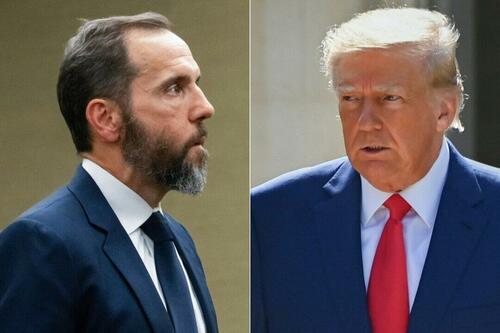Justice Thomas Raises Scrutiny On Special Counsel Jack Smith’s Appointment In Trump Hearing
Authored by Naveen Athrappully via The Epoch Times,
U.S. Supreme Court Justice Clarence Thomas has asked former President Donald Trump’s lawyers about whether they challenged special counsel Jack Smith’s authority to bring charges against the president.
On April 25, the U.S. Supreme Court heard oral arguments in a case about President Trump being immune from prosecution for official acts carried out during his presidency. During the hearing, Justice Thomas asked John Sauer, the attorney who represented Trump in court, “Did you, in this litigation, challenge the appointment of special counsel?” Mr. Smith was appointed to the case by Attorney General Merrick Garland.
Mr. Sauer said that Trump attorneys have not raised such concerns “directly” in the current case at the Supreme Court. However, “it points to a very important issue here, because one of [the prosecution’s] arguments is, of course, that we should have this presumption of regularity,” Sauer stated.
“That runs into the reality that we have here an extraordinary prosecutorial power being exercised by someone who was never nominated by the president or confirmed by the Senate at any time. … We hadn’t raised it yet in this case when this case went up on appeal.”
Mr. Sauer said he agrees with the “analysis provided by Attorney General [Edwin] Meese and Attorney General [Michael B.] Mukasey,” referring to the amicus brief the two former attorneys general submitted to the Supreme Court on March 19.
In it, the two attorneys general noted that irrespective of what one thinks about the immunity issue, Mr. Smith “does not have authority to conduct the underlying prosecution.”
“Those actions can be taken only by persons properly appointed as federal officers to properly created federal offices. Smith wields tremendous power, and effectively answers to no one,” they wrote.
“However, neither Smith nor the position of special counsel under which he purportedly acts meets those criteria. And that is a serious problem for the rule of law, whatever one may think of the conduct at issue in Smith’s prosecution.”
Attorney General Garland appointed Mr. Smith as Special Counsel of the U.S. Department of Justice (DOJ) citing several statutes.
However, none of these statutes even “remotely authorized the appointment by the Attorney General of a private citizen or government employee to receive extraordinary criminal law enforcement power under the title of Special Counsel.”
The two attorneys general added there are times when the appointment of a special counsel would be appropriate and that the U.S. Constitution allows for such appointments.
However, “the Attorney General cannot appoint someone never confirmed by the Senate, as a substitute United States Attorney under the title ‘special counsel,’” they added.
“Smith’s appointment was thus unlawful, as are all actions flowing from it, including his prosecution of former President Trump.”
The Case Against Trump
The U.S. Supreme Court is hearing President Trump’s immunity case as part of Mr. Smith’s indictment of the former president alleging an attempt to subvert the transfer of presidential power following the 2020 election. President Trump is charged with four criminal counts in the case.
President Trump had requested the lower courts to back his claims of presidential immunity as the actions were undertaken while he was serving as president.
After the lower courts refused to grant the request, the 45th president appealed to the U.S. Supreme Court, contending that his actions as president are covered by presidential immunity.
The Supreme Court agreed to consider the following question—“Whether and, if so, to what extent does a former president enjoy presidential immunity from criminal prosecution for conduct alleged to involve official acts during his tenure in office.”
In court, Mr. Sauer warned the justices against giving a judgment that undermines presidential immunity, noting that an American president would no longer be able to carry out his job properly if he was unsure whether his actions would trigger prosecution years after leaving office.
“The implications of the court’s decision here extend far beyond the facts of this case,” he said. “For 234 years of American history, no president was ever prosecuted for his official acts. The framers of our Constitution viewed an energetic executive as essential to securing liberty.”
“If a president can be charged, put on trial, and imprisoned for his most controversial decisions as soon as he leaves office, that looming threat will distort the president’s decision-making precisely when bold and fearless action is most needed.”
Moreover, a lack of presidential immunity will denote that every president becomes a potential candidate for extortion by political rivals while still in office, Mr. Sauer added.
“Prosecuting the president for his official acts is an innovation with no foothold in history or tradition, and is incompatible with our constitutional structure,” he said.
The Supreme Court Justices appeared skeptical about President Trump’s claims that he has the right to absolute immunity for his actions as president. However, the justices also appeared to be open to accepting that presidents have some level of immunity.
The court could decide to remand the case back to the Washington district court, with instructions for differentiating between official and private acts of a president so that additional fact-finding proceedings can be done.
Such a move would delay the former president’s trial in Washington and potentially proceedings related to three other cases as well. This gives President Trump a strategic win as he attempts to hold off cases until after the elections.
Tyler Durden
Sun, 04/28/2024 – 22:10

